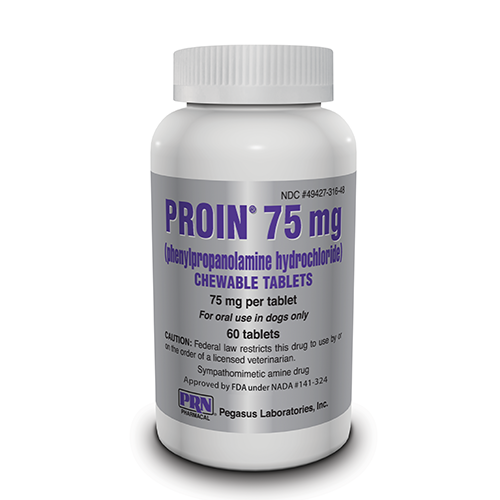
While safe at therapeutic doses when the chewable form is accidentally ingested in large amounts it can result in severe poisoning. There has been a very rare report of a possible stroke in dogs on PPA but the risk is extremely small.
PPA is indicated for the control of urinary incontinence caused by urethral sphincter incompetence in female dogs.
Ppa for dogs. PPA is indicated for the control of urinary incontinence caused by urethral sphincter incompetence in female dogs. 3 mgkg body weight per day PO administered as 15 mgkg PO BID or 10 mgkg PO TID. Patients may achieve an adequate clinical response with a lower dose.
Phenylpropanolamine also known as Proin is commonly used for treatment of urinary incontinence and nasal congestion in dogs and cats. Phenylpropanolamine is commonly referred to the the letters PPA. Phenylpropanolamine releases the chemical messenger norepinephrine from nerves.
Norepinephrine stimulates alpha-adrenergic and beta-adrenergic. A veterinarian may prescribe phenylpropanolamine to treat a dogs urinary incontinence. Phenylpropanolamine for dogs is a drug that is often prescribed for urinary incontinence.
It increases the strength of the muscles in the bladder and the urethra which in turn prevents the leakage of urine. Phenylpropanolamine PPA is a sympathomimetic agent which is used as a decongestant and appetite suppressant. It was commonly used in prescription and over-the-counter cough and cold preparations.
In veterinary medicine it is used to control urinary incontinence in dogs. Phenylpropanolamine is given by mouth and is used on and off label to treat urinary incontinence. Give as directed by your veterinarian.
The most common side effects include vomiting diarrhea lack of appetite increased thirst restlessness irritability and difficulty urinating. Do not use in pets that are allergic to it or are pregnant. The reason why it gets a bad name is that a few years ago human products containing PPA were withdrawn from the market.
The concern was that it could cause an increased risk of stroke in women. Strokes are not common in dogs. There has been a very rare report of a possible stroke in dogs on PPA but the risk is extremely small.
Phenylpropanolamine is the active ingredient in several brand name medications for dogs including Proin PPA-RD Cystolamine and Propalin. While most pups generally tolerate this medication pretty well its not without side effects most of. Phenylpropanolamine has been used for many years to successfully treat incontinence in dogs.
There were several years that it was not available when the FDA removed the human drug and it had to be reconsidered as a veterinary drug. Other treatments options were and are available and are sometimes still used. The recommended dosage of Phenylpropanolamine for dogs is between 04 and 08 mg per pound of body weight 08 to 17 mgkg every 12 hours twice daily.
The vet will determine the dogs usual dose. In case you forgot to give your dog Proin give the soft chew as soon as you remember. PPA is a medication which many dogs take for urinary incontinence.
It tends to work well but it can be a little pricey. I have a lot of dogs in my practice on an alternative medicine called Stilbestrol. Stilbestrol can be a little controversial.
PPA chewable tablets contain 50 mg of phenylpropanolamine hydrochloride. Phenylpropanolamine is an α-adrenergic agonist which has been shown to increase urethral sphincter pressure in dogs. Loss of urethral sphincter tone and decreased sphincter pressure is associated with urinary incontinence in ovariohysterectomized or anestrous dogs.
Phenylpropanolamine for Urinary Incontinance in Dogs. Phenylpropanolamine PPA an α1-adrenergic receptor agonist is often used in canines to help with urinary incontinence urine leakage by tightening the bladder sphincter muscle most commonly occurring in middle-aged spayed female dogs. PetHonesty Probiotics for Dogs - All-Natural Advanced Dog Probiotics Chews with Prebiotics Pumpkin Helps with Dog Diarrhea and Constipation Improves Digestion Allergy Immunity Health 44 out of 5 stars 7681.
Propalin Phenylpropanolamine PPA is used for the fast and effective management of urinary incontinence in dogs. Propalin is a PPA with proven efficacy rapid bioavailability and is clinically proven safe. It is a sympathomimetic non-hormonal agent that is manufactured and distributed in compliance with all US DEA.
Phenylpropanolamine commonly abbreviated as PPA by veterinary professionals as a stimulant used in veterinary medicine to treat urinary incontinence in dogs typically female spayed large breed dogs. While safe at therapeutic doses when the chewable form is accidentally ingested in large amounts it can result in severe poisoning. In order to be able to offer you the best Ppa Canine Incontinence available on the market today we have compiled a comprehensive Ppa Canine Incontinence list.
The best Ppa Canine Incontinence of 2021 is found after hours of research and using all the current models. See what we ranked below. 10 Best Ppa Canine Incontinence.
If your dog is over 10 years old and not in good health any amount of PPA toxicity can be fatal quickly. However if your dog is a young and healthy large breed dog and he ingested a large amount more than 6 mg of PPA per pound of body weight you may only notice a few signs such as nervousness diarrhea and high body temperature. Proin a popular veterinary form of phenylpropanolamine PPA is a sympathomimetic used to treat dogs with incontinence.
Aside from this phenylpropanolamine can also relieve stuffy noses which is why its sometimes used in nasal decongestant sprays. This FDA-approved drug is commercially available in doses designed for use in dogs. The dose and frequency needed for each animal tend to vary widely and may need to be increased over time to maintain continence Table 1.